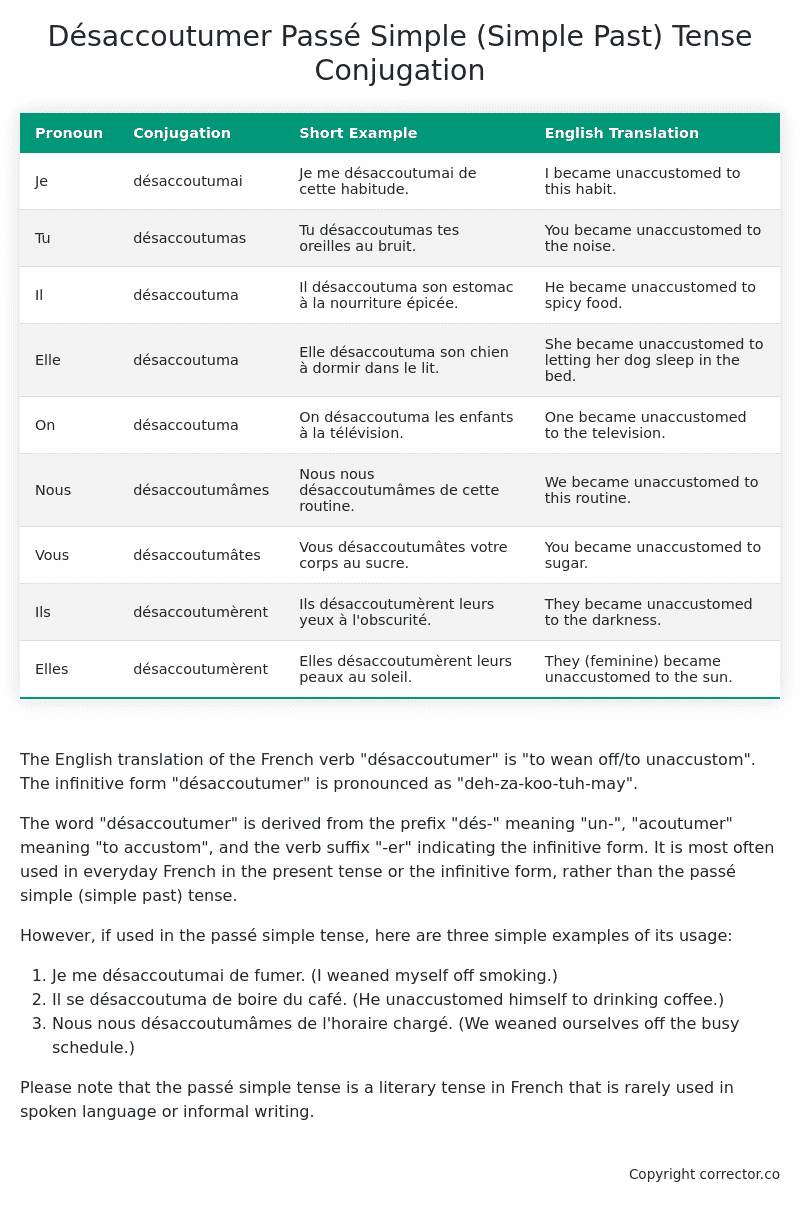Passé Simple (Simple Past) Tense Conjugation of the French Verb désaccoutumer
Introduction to the verb désaccoutumer
The English translation of the French verb “désaccoutumer” is “to wean off/to unaccustom”. The infinitive form “désaccoutumer” is pronounced as “deh-za-koo-tuh-may”.
The word “désaccoutumer” is derived from the prefix “dés-” meaning “un-“, “acoutumer” meaning “to accustom”, and the verb suffix “-er” indicating the infinitive form. It is most often used in everyday French in the present tense or the infinitive form, rather than the passé simple (simple past) tense.
However, if used in the passé simple tense, here are three simple examples of its usage:
- Je me désaccoutumai de fumer.
(I weaned myself off smoking.) - Il se désaccoutuma de boire du café.
(He unaccustomed himself to drinking coffee.) - Nous nous désaccoutumâmes de l’horaire chargé.
(We weaned ourselves off the busy schedule.)
Please note that the passé simple tense is a literary tense in French that is rarely used in spoken language or informal writing.
Table of the Passé Simple (Simple Past) Tense Conjugation of désaccoutumer
| Pronoun | Conjugation | Short Example | English Translation |
|---|---|---|---|
| Je | désaccoutumai | Je me désaccoutumai de cette habitude. | I became unaccustomed to this habit. |
| Tu | désaccoutumas | Tu désaccoutumas tes oreilles au bruit. | You became unaccustomed to the noise. |
| Il | désaccoutuma | Il désaccoutuma son estomac à la nourriture épicée. | He became unaccustomed to spicy food. |
| Elle | désaccoutuma | Elle désaccoutuma son chien à dormir dans le lit. | She became unaccustomed to letting her dog sleep in the bed. |
| On | désaccoutuma | On désaccoutuma les enfants à la télévision. | One became unaccustomed to the television. |
| Nous | désaccoutumâmes | Nous nous désaccoutumâmes de cette routine. | We became unaccustomed to this routine. |
| Vous | désaccoutumâtes | Vous désaccoutumâtes votre corps au sucre. | You became unaccustomed to sugar. |
| Ils | désaccoutumèrent | Ils désaccoutumèrent leurs yeux à l’obscurité. | They became unaccustomed to the darkness. |
| Elles | désaccoutumèrent | Elles désaccoutumèrent leurs peaux au soleil. | They (feminine) became unaccustomed to the sun. |
Other Conjugations for Désaccoutumer.
Le Present (Present Tense) Conjugation of the French Verb désaccoutumer
Imparfait (Imperfect) Tense Conjugation of the French Verb désaccoutumer
Passé Simple (Simple Past) Tense Conjugation of the French Verb désaccoutumer (You’re reading it right now!)
Passé Composé (Present Perfect) Tense Conjugation of the French Verb désaccoutumer
Futur Simple (Simple Future) Tense Conjugation of the French Verb désaccoutumer
Futur Proche (Near Future) Tense Conjugation of the French Verb désaccoutumer
Plus-que-parfait (Pluperfect) Tense Conjugation of the French Verb désaccoutumer
Passé Antérieur (Past Anterior) Tense Conjugation of the French Verb désaccoutumer
Futur Antérieur (Future Anterior) Tense Conjugation of the French Verb désaccoutumer
Subjonctif Présent (Subjunctive Present) Tense Conjugation of the French Verb désaccoutumer
Subjonctif Passé (Subjunctive Past) Tense Conjugation of the French Verb désaccoutumer
Subjonctif Imparfait (Subjunctive Imperfect) Tense Conjugation of the French Verb désaccoutumer
Conditionnel Présent (Conditional Present) Tense Conjugation of the French Verb désaccoutumer
Conditionnel Passé (Conditional Past) Tense Conjugation of the French Verb désaccoutumer
Conditionnel Passé II (Conditional Past II) Tense Conjugation of the French Verb désaccoutumer
L’impératif Présent (Imperative Present) Tense Conjugation of the French Verb désaccoutumer
L’impératif Passé (Imperative Past) Tense Conjugation of the French Verb désaccoutumer
L’infinitif Présent (Infinitive Present) Tense Conjugation of the French Verb désaccoutumer
L’infinitif Passé (Infinitive Past) Tense Conjugation of the French Verb désaccoutumer
Le Participe Présent (Present Participle) Tense Conjugation of the French Verb désaccoutumer
Le Participe Passé (Past Participle) Tense Conjugation of the French Verb désaccoutumer
Struggling with French verbs or the language in general? Why not use our free French Grammar Checker – no registration required!
Get a FREE Download Study Sheet of this Conjugation 🔥
Simply right click the image below, click “save image” and get your free reference for the désaccoutumer Passé Simple tense conjugation!

Désaccoutumer – About the French Passé Simple (Simple Past) Tense
Formation
Usage
Narration
Historical Context
Interactions with other tenses
Passé Composé
Imparfait
Conditional and Subjunctive
Summary
I hope you enjoyed this article on the verb désaccoutumer. Still in a learning mood? Check out another TOTALLY random French verb conjugation!


